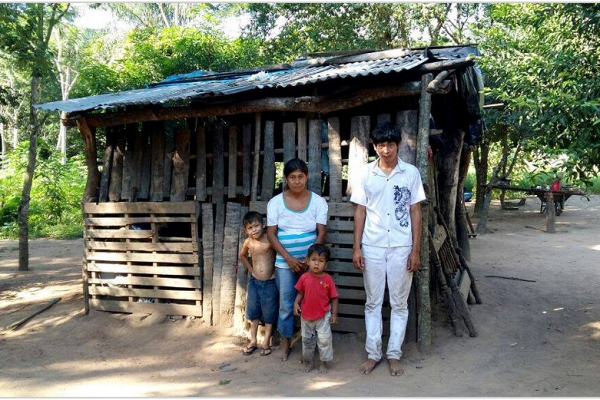
Handprints of God: Estela Comes Home
I love watching God work. In my experience, He’s very hard to predict, but when He has a plan, you can see His handprints all over it.
That’s what’s been happening in the little community of Hugua’i in rural Paraguay. We had been preparing for a youth team to come from our home church in Wilmore, Kentucky at the end of March. Because we had plans to build two houses for missionary families to use while they’re here for Guarani language study, the plan was for the group to work on one of those.
However, that changed when a couple of ladies from the church in our community wanted to talk to me. The church is called Ita Tenondegua, which means “cornerstone” in Guarani, the language folks in rural Paraguay prefer. Norma and Lili had been meeting with other ladies from the church to pray for their neighbors, and as they prayed, several began feeling a weight of responsibility toward a woman named Estela. Estela is a widow with five children, two of whom are very young. As the women were visiting her one day, having taken some food for the family, they began to feel terribly sad about her living situation. Her house was a makeshift wooden structure with boards haphazardly nailed upright around the outside, each with an inch or more of space between them. The roof, made of discarded corrugated steel sheets, was riddled with holes. When it rained, the water poured in through the roof and at the sides, and in a hard rain, the single bed and what few other belongings they had would get soaked. The women watched as Juan and David, the youngest children, sat down on the bare dirt outside to eat the food they had brought them. This was the last straw. They realized they had to do something.
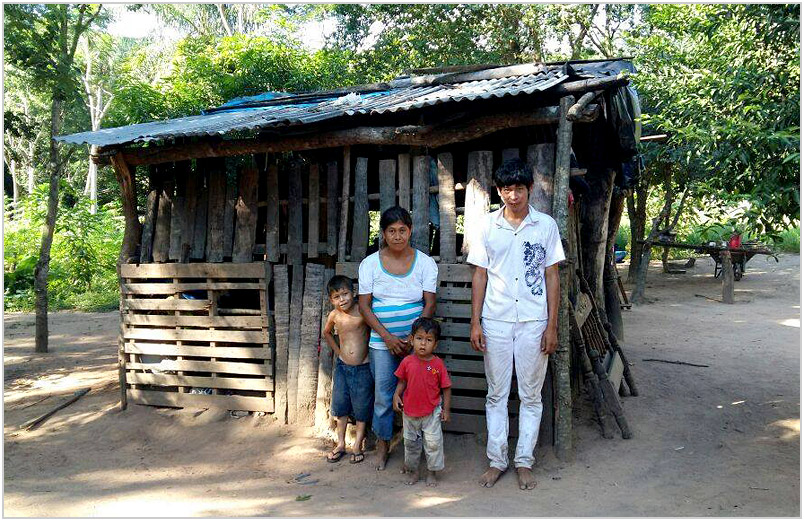
Estela comes from a First Nations background. Her people, long marginalized from majority Paraguayan society, are looked down on by many Paraguayans. They are the most discriminated-against people group in the country and have the least access to education and work opportunities. Many Paraguayans seem to think that if First Nations people live in intolerable conditions, it is simply what they are used to. There is a general mentality that they are not the responsibility of the larger population.
Norma and Lili shared all of this with me, finishing by asking, “What can we do about it?” As we talked and prayed, a plan began to form. We wondered could the team coming in March build a more permanent house for Estela? The land where she had her house had been her husband’s, but when he died it hadn’t passed to her, so she was technically squatting. We couldn’t build anything there. Norma committed to asking around to see if there was a small piece of property we could buy. We grew excited about the possibility of putting the widow’s family into a solid structure that would keep them dry when it rained and warm in the chill of the Paraguayan winter.
I shouldn’t have worried that the team would be wary about changing their project. The leaders of the Wilmore team were thrilled to be a part of something so impactful to a family and, consequently, to a community.
Within a short time, Norma found a woman who would sell a small piece of her property for only $600. Estela was delighted that she was going to get her own house on her own piece of land. We designed the simple structure, gathered materials, and began to raise the funds we’d need. I told our church in the nearby town of Paraguarí about the venture, and several of the members approached me about giving funds or materials or offering to work. WGM set up a donation page to raise $3,000 for the house and $600 for the property.
Within two or three days, all the money had been raised! Here’s an amazing story: Mark Bosscher, a missionary with Serving In Mission in Paraguay, who began studying Guarani with me in August, saw my post on Facebook about the house. Mark had recently left a lucrative practice as an attorney in Pella, Iowa, because he’d heard God call him and his wife, Jodi, to minister to First Nations people of Paraguay. Exhilarated that it would benefit not only a widow but one from a First Nations background, he contacted a friend back in Iowa. This friend had asked Mark to keep him posted about any opportunities in which he could be involved. The friend went to the WGM website and contributed the full $3,000 for the house! In less than a week, God had provided all the funds we needed in the way He almost always does—through His people responding to Him in obedience! (In fact, thanks to so many people responding to this need, we were able to provide some new furnishings for Estela and her family!)
With just days to go before the Wilmore team arrived, we had the property in our possession. Norma’s husband, Dani (pronounced “Donny,” short for Daniel), who is the pastor of the Ita Tenondegua church, and I went to measure and mark the foundations. Bricks were delivered, and Dani and other men from the church took turns digging the foundation. The weekend before the group came, I put out a call to the Paraguarí church to come help us get rocks for the foundation from a quarry in the forest. Seven believers from Paraguarí and three believers from Hugua’i came on a Sunday afternoon to help me get three pickup-loads of rock. Dani and other neighbors worked hard to get the foundation ready for the Wilmore group who would start laying brick on Friday.
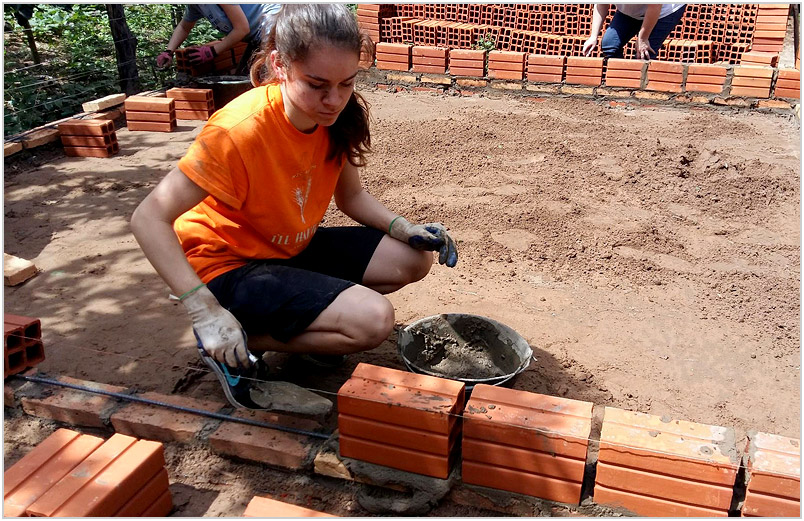
On Good Friday morning, I took the 13 members of the Wilmore team, who had arrived the day before, down the hill from our house and to the work site. They began by carrying the bricks 100 yards to the work site and clearing the property around the foundation. Some learned to mix mortar and lay brick—a couple of them got really good! Some dug a pit for a septic tank, and others broke rocks for the subfloor. Carrying mortar and sand, working together with men and women from our community, the team members served Christ with joyful attitudes and determination. With hesitant Spanish, through interpreters, and with signs and expressions and laughter, my neighbors from the south and my neighbors from the north developed a bond of shared labor and purpose.
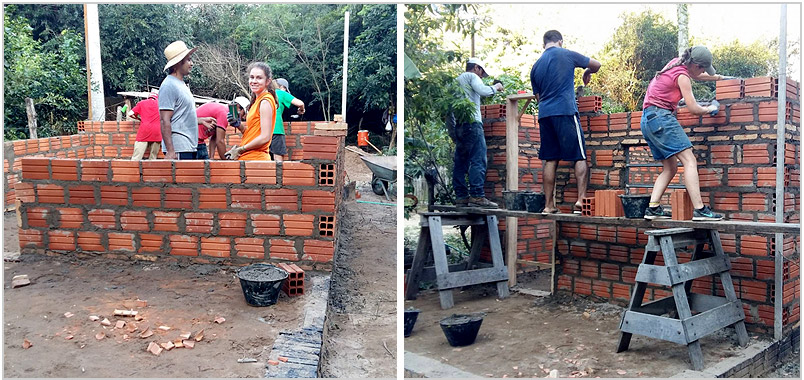
Over the weekend, we celebrated Easter together—Paraguayans and North Americans proclaiming the resurrection that brings us real life—contagious, exuberant, and authentic life. On Monday, we continued to live out that life by demonstrating the authenticity of the gospel we had declared over the weekend. If the Kingdom of God is real in our lives, families, and communities, it is meant to be spread through words and actions that verify its genuineness.
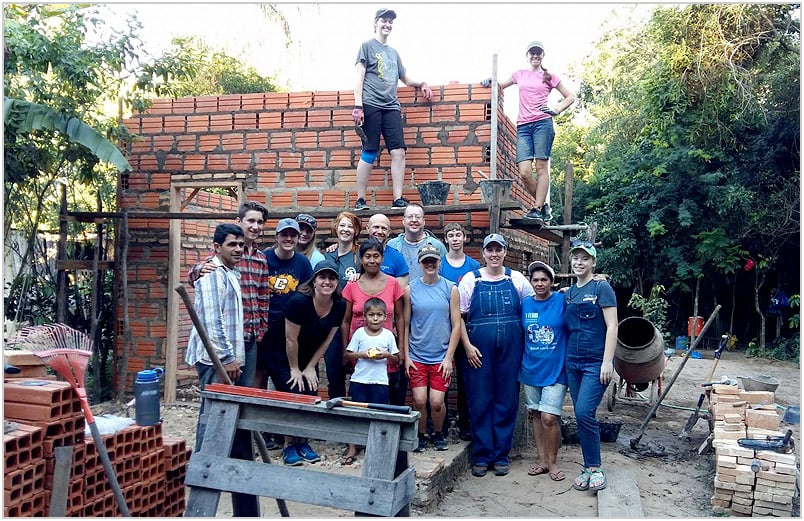
Each night the team gathered to share their highs and lows from the day. Throughout the week, we struggled with power and water problems, broken washing machines, and schedules changed by rain, but the young men and women from Kentucky celebrated God’s goodness. Coming from a generation supposedly characterized by entitlement and self-absorption, they affirmed that some of their favorite experiences were rainy rides home in the back of the pickup, washing clothes by hand in the bath tub, and taking baths in the stream. Rather than complaining, they demonstrated servanthood. For many, both a high and a low was seeing Estela’s current home and realizing the impact that their decision to obey God and come to Paraguay was helping make. My high one day was seeing youth pastor Andrea sitting with Griselda, the disabled daughter of Estela’s neighbor Ramona. Unable to communicate with words, they sat together, simply laughing for long periods of time.
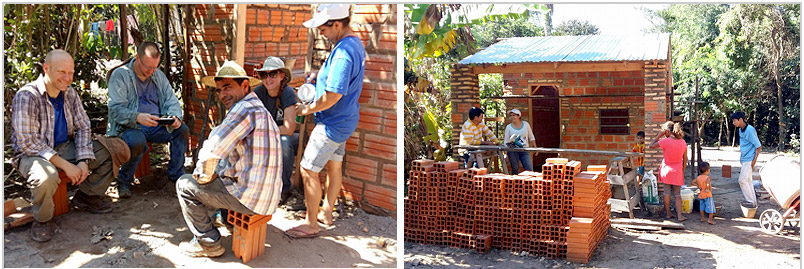
By the time the team left Hugua’i, barely a week after arriving, the house was almost finished. The last day they were on the work site, we gathered in a circle and prayed. Pastor Dani prayed for each one, and the Wilmore team gave Estela and her children some gifts. Estela, never one for many words, told them that she had no way to pay for what they had done for her. We realized that with those words, she was expressing the meaning of grace. Estela’s second youngest, Juan, 6 years old, who had never said a single word to me, came up and gave me a big hug.
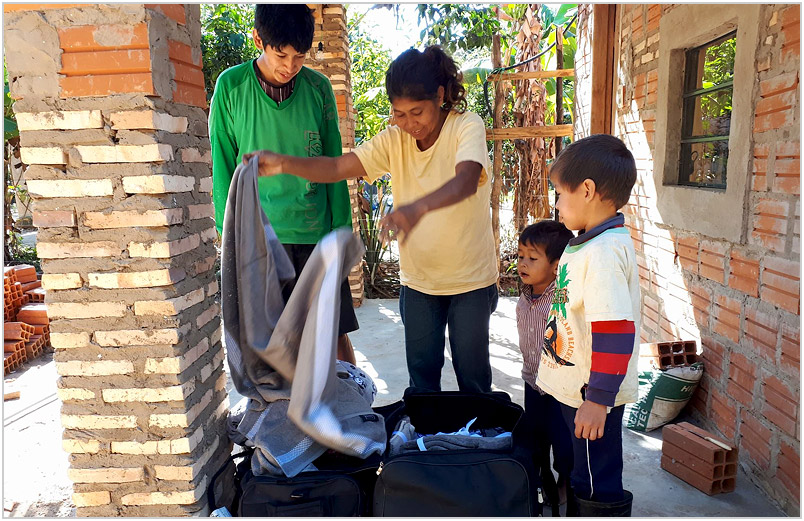
Just a few weeks after the team left, Estela and her children moved into their new home. How does God do things? He gathers people, sometimes from areas far apart, and puts a desire in their hearts. What one can’t do, many can accomplish together, each one playing a unique and divinely-assigned role. The act may be small, but the meaning is never small and is never insignificant to those who are involved. When people obey and unite and submit to one another in love and genuine service, God receives the glory and lives are changed. The result doesn’t belong to those who did it, but to Him. And yet, they get to be a part of His plan!
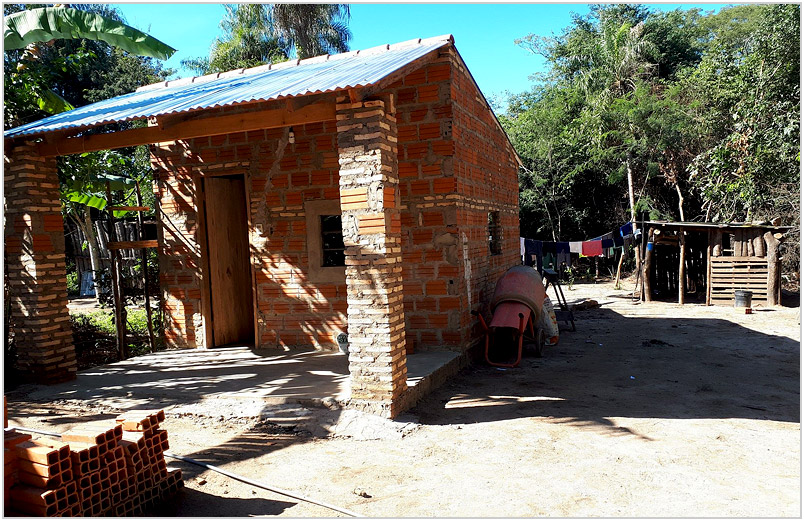
Action Steps
PRAY: Pray for the ongoing impact of this home construction project. Pray that God’s love will shine through, and that Estela, having seen grace in action, will surrender to the message of Easter and find herself, at last, truly at home.
GO: Are you ready to step up and help meet a need on a mission field like this team did? Whether you want to help with construction, Vacation Bible School, medical care, or other projects, you’ll make a real impact! Let’s start the conversation at wgm.org/go.
Andy Bowen and his wife, Lizet, currently live in Paraguay with their three boys. You can find them on Facebook at www.facebook.com/BowensInParaguay.
The Call (Fall/Winter 2018)







